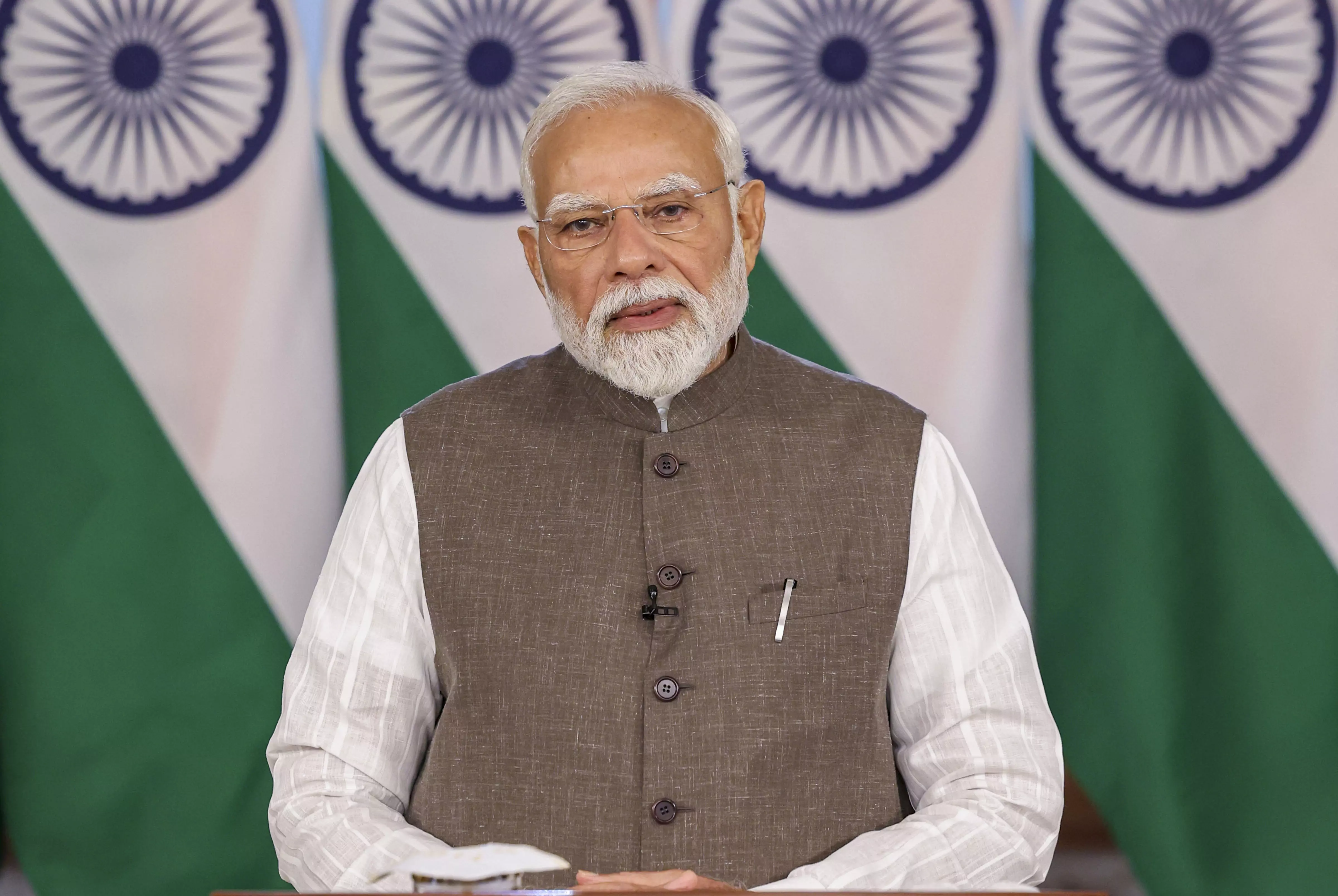PM Modi Lists Five Priorities for Disaster-Proof Infra
Modi noted that India has established a tsunami-warning system benefitting 29 countries

Prime Minister Narendra Modi speaks as he delivers a message for the ‘International Conference on Disaster Resilient Infrastructure 2025’. (PMO via PTI Photo)
NEW DELHI: Prime Minister Narendra Modi on Saturday outlined five key global priorities to build disaster-resilient infrastructure, including a skilled workforce, a global digital repository to document best practices and innovative financing. He said that strengthening early-warning systems and coordination is another crucial aspect.
Addressing the International Conference on Disaster Resilient Infrastructure 2025 via videoconferencing, Mr Modi noted that India has established a tsunami-warning system benefitting 29 countries and that it recognises the Small Island Developing States (Sida) as large-ocean countries and the need for special attention to their vulnerabilities.
With the event being hosted in Europe for the first time, the Prime Minister thanked French President Emmanuel Macron and extended his best wishes to him for the upcoming United Nations Oceans Conference.
Mr Modi noted that the conference's theme is "Shaping a Resilient Future for Coastal Regions" and underscored the vulnerability of coastal regions and islands to natural disasters and climate change.
Citing recent disasters, including Cyclone Remal in India and Bangladesh, Hurricane Beryl in the Caribbean, Typhoon Yagi in Southeast Asia, Hurricane Helene in the United States, Typhoon Usagi in the Philippines and Cyclone Chido in parts of Africa, Mr Modi emphasised that these disasters have caused significant damage to lives and property, reinforcing the need for resilient infrastructure and proactive disaster management.
Recalling India's past experiences with devastating disasters, including the super-cyclone of 1999 and the tsunami of 2004, the Prime Minister highlighted how the country adapted and rebuilt with resilience, constructing cyclone shelters across vulnerable areas and contributing to the establishment of the tsunami-warning system benefitting 29 nations.
Mr Modi said that disaster resilience requires innovative financing and called for the creation of actionable programmes to ensure that developing countries have access to the necessary funds.
The Prime Minister highlighted the necessity of strengthening early-warning systems and coordination, noting their critical role in facilitating timely decision-making and effective last-mile communication.
Mr Modi called for the construction of infrastructure that remains steadfast against time and tide, emphasising the need for resilience in development. Mr Modi further called for global efforts to build a strong and disaster-resilient future for the world.
Addressing the International Conference on Disaster Resilient Infrastructure 2025 via videoconferencing, Mr Modi noted that India has established a tsunami-warning system benefitting 29 countries and that it recognises the Small Island Developing States (Sida) as large-ocean countries and the need for special attention to their vulnerabilities.
With the event being hosted in Europe for the first time, the Prime Minister thanked French President Emmanuel Macron and extended his best wishes to him for the upcoming United Nations Oceans Conference.
Mr Modi noted that the conference's theme is "Shaping a Resilient Future for Coastal Regions" and underscored the vulnerability of coastal regions and islands to natural disasters and climate change.
Citing recent disasters, including Cyclone Remal in India and Bangladesh, Hurricane Beryl in the Caribbean, Typhoon Yagi in Southeast Asia, Hurricane Helene in the United States, Typhoon Usagi in the Philippines and Cyclone Chido in parts of Africa, Mr Modi emphasised that these disasters have caused significant damage to lives and property, reinforcing the need for resilient infrastructure and proactive disaster management.
Recalling India's past experiences with devastating disasters, including the super-cyclone of 1999 and the tsunami of 2004, the Prime Minister highlighted how the country adapted and rebuilt with resilience, constructing cyclone shelters across vulnerable areas and contributing to the establishment of the tsunami-warning system benefitting 29 nations.
Mr Modi said that disaster resilience requires innovative financing and called for the creation of actionable programmes to ensure that developing countries have access to the necessary funds.
The Prime Minister highlighted the necessity of strengthening early-warning systems and coordination, noting their critical role in facilitating timely decision-making and effective last-mile communication.
Mr Modi called for the construction of infrastructure that remains steadfast against time and tide, emphasising the need for resilience in development. Mr Modi further called for global efforts to build a strong and disaster-resilient future for the world.
( Source : Deccan Chronicle )
Next Story

